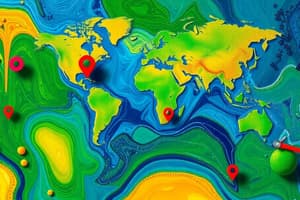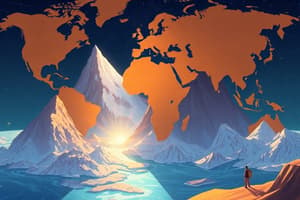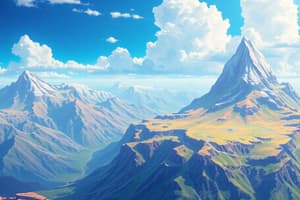Podcast
Questions and Answers
What does physical geography primarily focus on?
What does physical geography primarily focus on?
- Natural features and processes (correct)
- Human cultures and activities
- Globalization effects on societies
- Economic activities and their distribution
Which term describes the unique characteristics of a location?
Which term describes the unique characteristics of a location?
- Movement
- Location
- Place (correct)
- Region
What does the term 'human-environment interaction' refer to?
What does the term 'human-environment interaction' refer to?
- The characteristics of specific locations
- The movement of goods and people
- The study of landforms and climate
- How humans alter their surroundings (correct)
Which branch of geography involves the use of tools like GIS and remote sensing?
Which branch of geography involves the use of tools like GIS and remote sensing?
What is referred to as the 'art and science of map-making'?
What is referred to as the 'art and science of map-making'?
Which climate zone is characterized by extreme temperatures and low precipitation?
Which climate zone is characterized by extreme temperatures and low precipitation?
Which of the following major global issues involves the expansion of cities?
Which of the following major global issues involves the expansion of cities?
What is the focus of economic geography?
What is the focus of economic geography?
Flashcards are hidden until you start studying
Study Notes
Key Concepts in Geography
-
Definition: Geography is the study of the Earth's landscapes, environments, and the relationships between people and their environments.
-
Branches of Geography:
- Physical Geography: Focuses on natural features and processes (landforms, climate, ecosystems).
- Human Geography: Examines human activities, cultures, economies, and their relationships with the environment.
- Geospatial Technology: Involves tools and techniques like GIS (Geographic Information Systems), remote sensing, and cartography.
-
Key Terminology:
- Location: The position of something on the Earth's surface (absolute vs. relative).
- Place: Characteristics that make a location unique (physical and human attributes).
- Region: An area defined by common features (cultural, physical, political).
- Movement: How and why people, goods, and ideas move from one location to another.
- Human-Environment Interaction: How humans adapt to and modify their environment.
-
Major Features of Earth's Surface:
- Landforms: Mountains, valleys, plateaus, plains, hills.
- Water Bodies: Oceans, seas, rivers, lakes.
- Climate Zones: Tropical, temperate, polar, arid.
-
Cartography: The art and science of map-making, essential for visual representation of geographic data.
-
Cultural Geography: Studies cultural practices, beliefs, and how they are influenced by geography (language, religion, ethnicity).
-
Economic Geography: Examines how economic activities are distributed in space and their impacts on the environment.
-
Environmental Geography: Focuses on the interactions between humans and the natural world, including issues like climate change and sustainability.
-
Globalization: The increasing interconnectedness of countries and cultures, affecting economic, political, and social landscapes.
Important Tools and Techniques
- GIS (Geographic Information Systems): A system for capturing, storing, analyzing, and managing spatial and geographic data.
- Remote Sensing: The use of satellite or aerial imagery to gather information about the Earth.
- Topographic Maps: Detailed maps showing elevation and terrain.
Key Global Issues in Geography
- Urbanization: The growth of cities and the migration of people to urban areas.
- Climate Change: The long-term alteration of temperature and typical weather patterns in a place.
- Natural Disasters: Understanding the geographical distribution and causes of events such as earthquakes, floods, and hurricanes.
- Resource Management: Sustainable practices in managing natural resources like water, minerals, and forests.
Geographic Skills
- Spatial Thinking: The ability to visualize and understand spatial relationships.
- Map Reading: Interpreting and analyzing different types of maps.
- Data Analysis: Using data to understand geographic trends and patterns.
Definition and Scope of Geography
- Geography studies the Earth's landscapes, environments, and the relationships between humans and their environments.
Branches of Geography
- Physical Geography: Concentrates on natural features and processes, including landforms, climate, and ecosystems.
- Human Geography: Investigates human activities, cultures, and economies, exploring their interactions with the environment.
- Geospatial Technology: Utilizes tools such as GIS (Geographic Information Systems), remote sensing, and cartography for spatial analysis.
Key Terminology
- Location: Refers to a specific position on the Earth's surface, which can be absolute (precise) or relative (in relation to other locations).
- Place: Unique characteristics of a location, encompassing both physical and human attributes.
- Region: An area defined by shared features, which can be cultural, physical, or political.
- Movement: The dynamics of how and why people, goods, and ideas travel from one location to another.
- Human-Environment Interaction: Examines how humans adapt to and alter their environments.
Major Features of Earth's Surface
- Landforms: Includes mountains, valleys, plateaus, plains, and hills.
- Water Bodies: Covers oceans, seas, rivers, and lakes.
- Climate Zones: Categorizes regions as tropical, temperate, polar, or arid.
- Cartography: The science and art of map-making, pivotal for visualizing geographic data.
Specialized Areas in Geography
- Cultural Geography: Analyzes cultural practices and beliefs and their geographical influences, including language and religion.
- Economic Geography: Studies spatial distribution of economic activities and their environmental impacts.
- Environmental Geography: Focuses on the relationship between humans and the natural world, addressing climate change and sustainability.
- Globalization: Examines the increasing interconnectivity of countries and cultures, impacting economies, politics, and societies.
Important Tools and Techniques
- GIS (Geographic Information Systems): A system for managing and analyzing geographic data.
- Remote Sensing: Utilizes satellite or aerial imagery to collect data about the Earth.
- Topographic Maps: Detailed maps that illustrate elevation and terrain features.
Key Global Issues in Geography
- Urbanization: Involves the expansion of cities and the shift of populations towards urban areas.
- Climate Change: Refers to significant long-term changes in temperature and weather patterns.
- Natural Disasters: Focuses on geographical factors contributing to events like earthquakes, floods, and hurricanes.
- Resource Management: Involves sustainable approaches to managing natural resources, such as water and forests.
Geographic Skills
- Spatial Thinking: The proficiency in visualizing and comprehending spatial relationships.
- Map Reading: Skills required for interpreting various types of maps effectively.
- Data Analysis: The ability to use data to identify geographic trends and patterns.
Studying That Suits You
Use AI to generate personalized quizzes and flashcards to suit your learning preferences.




